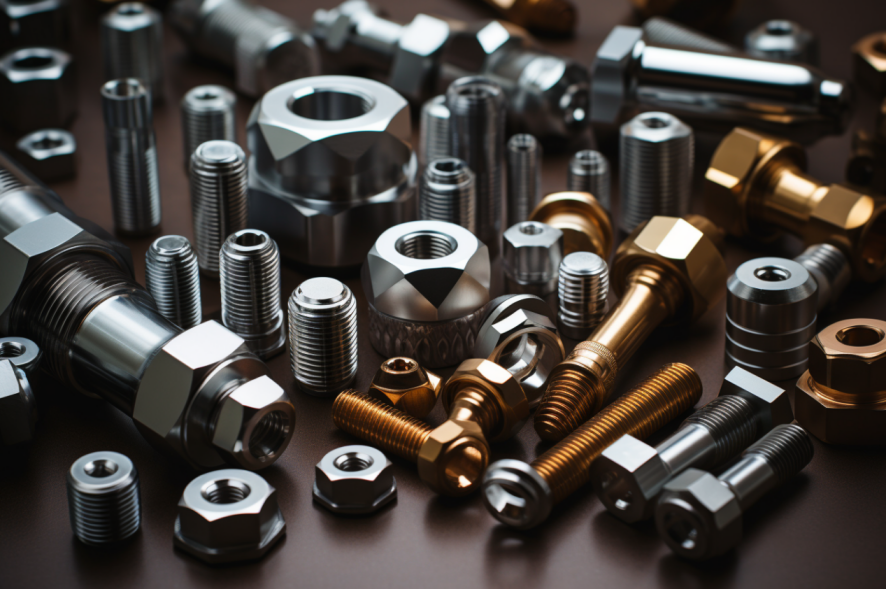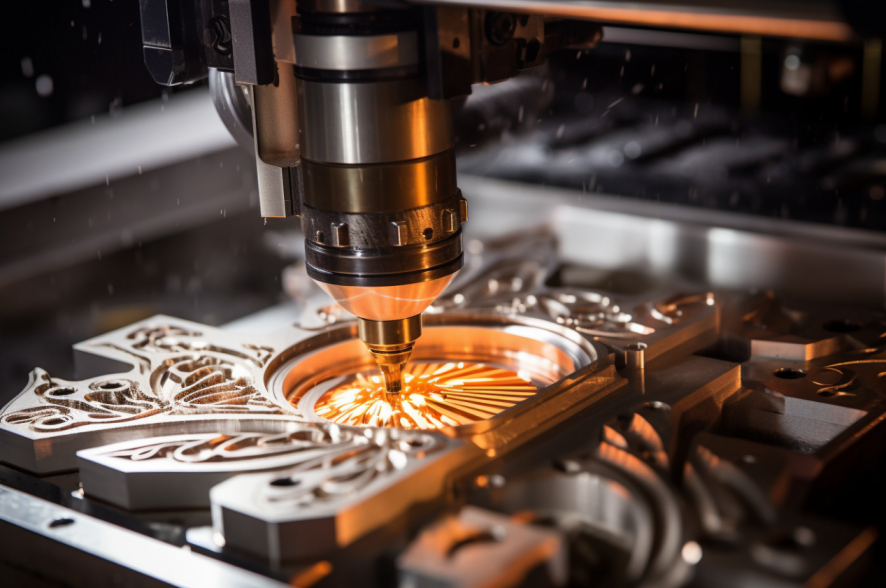Blog
We regularly update articles related to the prototyping and manufacturing industry. You’re welcome to check our previous blogs and subscribe to our newsletter.
What Makes CNC Metal Machining Essential in Modern Manufacturing?
In the contemporary manufacturing scene, CNC metal machining stands as a crucial cornerstone, reshaping the creation of complex metal components. By harnessing Computer Numerical Control (CNC) technology, this approach ensures exactness, effectiveness, and consistency, culminating in superior end results. Taking the helm in this domain is Louis Machine, a revered manufacturer acknowledged for its expertise in CNC metal machining.
Definition and Basics of CNC Machining
1.1 CNC Technology:
At its core, CNC machining involves the use of computerized controls to operate and manipulate machine tools, such as mills, lathes, drills, and grinders. These machines precisely execute programmed commands, guiding the cutting tools with utmost accuracy.
1.2 Importance in Modern Manufacturing:
The advent of CNC machining has transformed manufacturing by streamlining production processes and enhancing product quality. Its automated nature reduces manual labor, minimizes errors, and accelerates production rates, making it indispensable in various industries, from aerospace to automotive and beyond.
Types of CNC Metal Machining Processes
2.1 Milling:
In milling, rotating cutting tools remove material from a workpiece to achieve the desired shape and dimensions. Louis Machine employs state-of-the-art milling machines, enabling precise and intricate metal shaping.
2.2 Turning:
Turning involves rotating a workpiece while a cutting tool removes material to create cylindrical components. CNC lathes, a staple in Louis Machine’s arsenal, excel in producing shafts, pins, and other cylindrical parts with exceptional accuracy.
2.3 Drilling:
CNC drilling operations bore precise holes into metal components, catering to diverse industrial needs. Louis Machine’s advanced drilling capabilities ensure consistent hole placement and diameter across production runs.
2.4 Grinding:
For precision finishing and surface refinement, CNC grinding employs abrasive wheels to remove material from metal surfaces. Louis Machine’s expertise in CNC grinding guarantees superior surface quality and dimensional accuracy.
2.5 EDM (Electrical Discharge Machining):
This process uses electrical discharges to erode metal, enabling the creation of intricate shapes and features. Louis Machine harnesses EDM technology to produce complex components with unparalleled precision.
2.6 Laser Cutting:
CNC laser cutting delivers precise and clean cuts through metal sheets, offering versatility and speed in fabrication. Louis Machine’s cutting-edge laser systems ensure swift and accurate metal cutting for various applications.
Advantages of CNC Metal Machining
3.1 Precision and Accuracy:
CNC machining surpasses traditional methods in accuracy, delivering parts with tight tolerances and impeccable precision, meeting the most stringent quality standards.
3.2 Efficiency:
With automated processes and optimized tool paths, CNC machining accelerates production rates, reducing lead times and enhancing overall efficiency.
3.3 Complex Geometries:
Louis Machine’s CNC capabilities empower the fabrication of intricate parts and complex geometries that would be impractical or impossible with conventional methods.
3.4 Consistency:
By eliminating human error and ensuring uniformity in production, CNC machining guarantees consistency across large batches of components, maintaining quality standards with every piece.
3.5 Automation:
Louis Machine’s investment in CNC technology not only enhances productivity but also reduces reliance on manual labor, lowering production costs and enhancing competitiveness in the market.
Applications Across Industries
4.1 Automotive Industry
CNC machining plays a pivotal role in the automotive industry, facilitating the production of engine parts, chassis components, and complex assemblies. Louis Machine leverages its expertise to deliver high-precision components that meet the demanding requirements of leading automotive manufacturers. From prototype development to mass production, Louis Machine’s CNC solutions drive innovation and excellence in the automotive sector.

4.2 Medical Industry
In the medical field, CNC machining enables the fabrication of implants, surgical instruments, and medical devices with exceptional precision and biocompatibility. Louis Machine specializes in producing critical medical components, ensuring superior quality and dimensional accuracy. With a focus on precision and reliability, Louis Machine’s CNC solutions contribute to advancements in healthcare and patient care.
4.3 Electronics Industry
Precision is paramount in the electronics industry, where CNC machining is used for machining circuit boards, connectors, and electronic housings. Louis Machine’s advanced CNC capabilities enable the production of complex electronic components with tight tolerances and intricate features. From consumer electronics to industrial applications, Louis Machine delivers high-quality components that meet the rigorous standards of the electronics market.
4.4 Tool and Die Making
CNC machining plays a vital role in tool and die making, where precision and durability are essential for creating molds, dies, and tooling components. Louis Machine specializes in producing high-precision tooling solutions for various industries, including automotive, aerospace, and consumer goods. With advanced CNC technologies, Louis Machine delivers tooling solutions that meet the stringent requirements of modern manufacturing processes.
Challenges in CNC Metal Machining
Despite its numerous benefits, CNC metal machining presents several challenges that manufacturers like Louis Machine must address to ensure optimal performance and productivity.
5.1 Initial Setup Costs
Investment in CNC machines and training for operators can pose significant initial setup costs for manufacturers. Louis Machine understands the importance of strategic investment in technology and human resources to overcome this challenge and remain competitive in the market.
5.2 Programming Complexities
CNC programming requires specialized skills and expertise, leading to a learning curve for operators. Louis Machine invests in training programs and employs skilled programmers to optimize CNC machining processes and maximize efficiency.
5.3 Material Limitations
Challenges may arise when machining certain materials, such as hardened steel or exotic alloys, which require specialized tooling and machining strategies. Louis Machine employs advanced tooling technologies and machining techniques to overcome material limitations and deliver high-quality components across a wide range of materials.
5.4 Maintenance Requirements
Regular maintenance is essential to ensure optimal machine performance and prevent downtime. Louis Machine adheres to strict maintenance schedules and employs skilled technicians to address maintenance requirements promptly, minimizing disruptions to production processes.
Future Trends in CNC Metal Machining
The future of CNC metal machining is shaped by technological advancements and emerging trends that promise to revolutionize the manufacturing landscape.
6.1 Advancements in Automation
Integration of AI and machine learning algorithms enables smarter and more adaptive machining processes, enhancing productivity and efficiency. Louis Machine explores automation technologies to streamline CNC machining operations and stay ahead in a rapidly evolving market.
6.2 3D Printing/Additive Manufacturing
The fusion of CNC machining with additive manufacturing techniques opens up new possibilities for hybrid manufacturing processes. Louis Machine explores the integration of CNC machining with additive manufacturing to unlock opportunities for rapid prototyping, customized production, and complex geometries.
6.3 Nanotechnology Applications
Precision machining at the nanoscale holds immense potential for cutting-edge industries such as electronics, healthcare, and materials science. Louis Machine invests in nanotechnology research and development to push the boundaries of precision machining and meet the evolving needs of diverse industries.
6.4 Sustainability Initiatives
As environmental concerns grow, sustainability initiatives become increasingly important in CNC machining. Louis Machine adopts eco-friendly practices to reduce waste, minimize energy consumption, and enhance resource efficiency, contributing to a more sustainable and responsible manufacturing ecosystem.

Conclusion
In conclusion, CNC metal machining, epitomized by Louis Machine’s expertise, represents the pinnacle of precision engineering in modern manufacturing. With its array of processes, from milling to laser cutting, CNC machining offers unparalleled advantages in terms of precision, efficiency, and automation, driving innovation and excellence across industries. As technology continues to evolve, the role of CNC machining in shaping the future of manufacturing remains indispensable.





